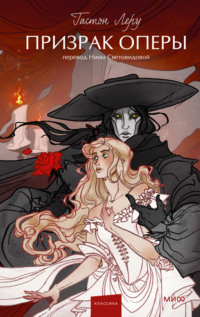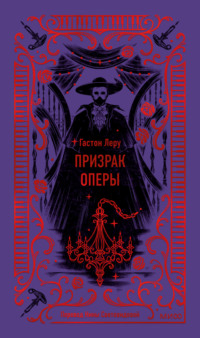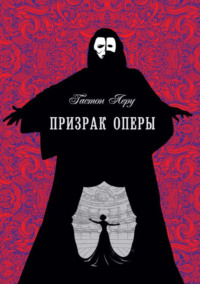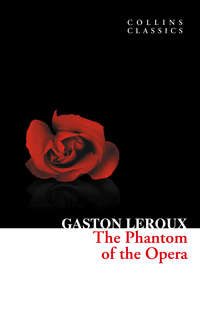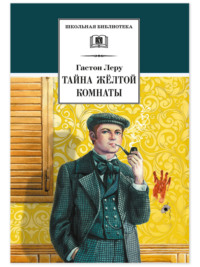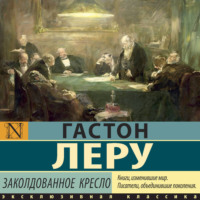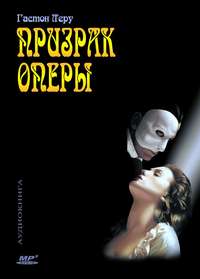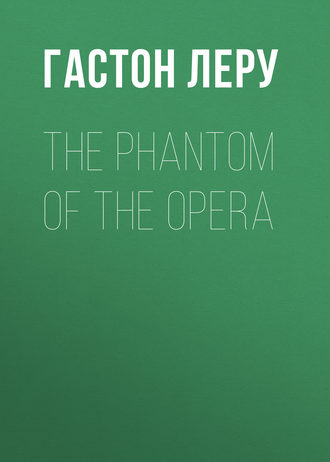 полная версия
полная версияThe Phantom of the Opera
"Christine!"
"Raoul!"
The young man tried to take her in his arms, but she escaped and fled in great disorder.
While Christine remained locked in her room, Raoul was at his wit's end what to do. He refused to breakfast. He was terribly concerned and bitterly grieved to see the hours, which he had hoped to find so sweet, slip past without the presence of the young Swedish girl. Why did she not come to roam with him through the country where they had so many memories in common? He heard that she had had a mass said, that morning, for the repose of her father's soul and spent a long time praying in the little church and on the fiddler's tomb. Then, as she seemed to have nothing more to do at Perros and, in fact, was doing nothing there, why did she not go back to Paris at once?
Raoul walked away, dejectedly, to the graveyard in which the church stood and was indeed alone among the tombs, reading the inscriptions; but, when he turned behind the apse, he was suddenly struck by the dazzling note of the flowers that straggled over the white ground. They were marvelous red roses that had blossomed in the morning, in the snow, giving a glimpse of life among the dead, for death was all around him. It also, like the flowers, issued from the ground, which had flung back a number of its corpses. Skeletons and skulls by the hundred were heaped against the wall of the church, held in position by a wire that left the whole gruesome stack visible. Dead men's bones, arranged in rows, like bricks, to form the first course upon which the walls of the sacristy had been built. The door of the sacristy opened in the middle of that bony structure, as is often seen in old Breton churches.
Raoul said a prayer for Daae and then, painfully impressed by all those eternal smiles on the mouths of skulls, he climbed the slope and sat down on the edge of the heath overlooking the sea. The wind fell with the evening. Raoul was surrounded by icy darkness, but he did not feel the cold. It was here, he remembered, that he used to come with little Christine to see the Korrigans dance at the rising of the moon. He had never seen any, though his eyes were good, whereas Christine, who was a little shortsighted, pretended that she had seen many. He smiled at the thought and then suddenly gave a start. A voice behind him said:
"Do you think the Korrigans will come this evening?"
It was Christine. He tried to speak. She put her gloved hand on his mouth.
"Listen, Raoul. I have decided to tell you something serious, very serious … Do you remember the legend of the Angel of Music?"
"I do indeed," he said. "I believe it was here that your father first told it to us."
"And it was here that he said, 'When I am in Heaven, my child, I will send him to you.' Well, Raoul, my father is in Heaven, and I have been visited by the Angel of Music."
"I have no doubt of it," replied the young man gravely, for it seemed to him that his friend, in obedience to a pious thought, was connecting the memory of her father with the brilliancy of her last triumph.
Christine appeared astonished at the Vicomte de Chagny's coolness:
"How do you understand it?" she asked, bringing her pale face so close to his that he might have thought that Christine was going to give him a kiss; but she only wanted to read his eyes in spite of the dark.
"I understand," he said, "that no human being can sing as you sang the other evening without the intervention of some miracle. No professor on earth can teach you such accents as those. You have heard the Angel of Music, Christine."
"Yes," she said solemnly, "IN MY DRESSING-ROOM. That is where he comes to give me my lessons daily."
"In your dressing-room?" he echoed stupidly.
"Yes, that is where I have heard him; and I have not been the only one to hear him."
"Who else heard him, Christine?"
"You, my friend."
"I? I heard the Angel of Music?"
"Yes, the other evening, it was he who was talking when you were listening behind the door. It was he who said, 'You must love me.' But I then thought that I was the only one to hear his voice. Imagine my astonishment when you told me, this morning, that you could hear him too."
Raoul burst out laughing. The first rays of the moon came and shrouded the two young people in their light. Christine turned on Raoul with a hostile air. Her eyes, usually so gentle, flashed fire.
"What are you laughing at? YOU think you heard a man's voice, I suppose?"
"Well! …" replied the young man, whose ideas began to grow confused in the face of Christine's determined attitude.
"It's you, Raoul, who say that? You, an old playfellow of my own! A friend of my father's! But you have changed since those days. What are you thinking of? I am an honest girl, M. le Vicomte de Chagny, and I don't lock myself up in my dressing-room with men's voices. If you had opened the door, you would have seen that there was nobody in the room!"
"That's true! I did open the door, when you were gone, and I found no one in the room."
"So you see! … Well?"
The viscount summoned up all his courage.
"Well, Christine, I think that somebody is making game of you."
She gave a cry and ran away. He ran after her, but, in a tone of fierce anger, she called out: "Leave me! Leave me!" And she disappeared.
Raoul returned to the inn feeling very weary, very low-spirited and very sad. He was told that Christine had gone to her bedroom saying that she would not be down to dinner. Raoul dined alone, in a very gloomy mood. Then he went to his room and tried to read, went to bed and tried to sleep. There was no sound in the next room.
The hours passed slowly. It was about half-past eleven when he distinctly heard some one moving, with a light, stealthy step, in the room next to his. Then Christine had not gone to bed! Without troubling for a reason, Raoul dressed, taking care not to make a sound, and waited. Waited for what? How could he tell? But his heart thumped in his chest when he heard Christine's door turn slowly on its hinges. Where could she be going, at this hour, when every one was fast asleep at Perros? Softly opening the door, he saw Christine's white form, in the moonlight, slipping along the passage. She went down the stairs and he leaned over the baluster above her. Suddenly he heard two voices in rapid conversation. He caught one sentence: "Don't lose the key."
It was the landlady's voice. The door facing the sea was opened and locked again. Then all was still.
Raoul ran back to his room and threw back the window. Christine's white form stood on the deserted quay.
The first floor of the Setting Sun was at no great height and a tree growing against the wall held out its branches to Raoul's impatient arms and enabled him to climb down unknown to the landlady. Her amazement, therefore, was all the greater when, the next morning, the young man was brought back to her half frozen, more dead than alive, and when she learned that he had been found stretched at full length on the steps of the high altar of the little church. She ran at once to tell Christine, who hurried down and, with the help of the landlady, did her best to revive him. He soon opened his eyes and was not long in recovering when he saw his friend's charming face leaning over him.
A few weeks later, when the tragedy at the Opera compelled the intervention of the public prosecutor, M. Mifroid, the commissary of police, examined the Vicomte de Chagny touching the events of the night at Perros. I quote the questions and answers as given in the official report pp. 150 et seq.:
Q. "Did Mlle. Daae not see you come down from your room by the curious road which you selected?"
R. "No, monsieur, no, although, when walking behind her, I took no pains to deaden the sound of my footsteps. In fact, I was anxious that she should turn round and see me. I realized that I had no excuse for following her and that this way of spying on her was unworthy of me. But she seemed not to hear me and acted exactly as though I were not there. She quietly left the quay and then suddenly walked quickly up the road. The church-clock had struck a quarter to twelve and I thought that this must have made her hurry, for she began almost to run and continued hastening until she came to the church."
Q. "Was the gate open?"
R. "Yes, monsieur, and this surprised me, but did not seem to surprise Mlle. Daae."
Q. "Was there no one in the churchyard?"
R. "I did not see any one; and, if there had been, I must have seen him. The moon was shining on the snow and made the night quite light."
Q. "Was it possible for any one to hide behind the tombstones?"
R. "No, monsieur. They were quite small, poor tombstones, partly hidden under the snow, with their crosses just above the level of the ground. The only shadows were those of the crosses and ourselves. The church stood out quite brightly. I never saw so clear a night. It was very fine and very cold and one could see everything."
Q. "Are you at all superstitious?"
R. "No, monsieur, I am a practising Catholic,"
Q. "In what condition of mind were you?"
R. "Very healthy and peaceful, I assure you. Mlle. Daae's curious action in going out at that hour had worried me at first; but, as soon as I saw her go to the churchyard, I thought that she meant to fulfil some pious duty on her father's grave and I considered this so natural that I recovered all my calmness. I was only surprised that she had not heard me walking behind her, for my footsteps were quite audible on the hard snow. But she must have been taken up with her intentions and I resolved not to disturb her. She knelt down by her father's grave, made the sign of the cross and began to pray. At that moment, it struck midnight. At the last stroke, I saw Mlle. Daae life{sic} her eyes to the sky and stretch out her arms as though in ecstasy. I was wondering what the reason could be, when I myself raised my head and everything within me seemed drawn toward the invisible, WHICH WAS PLAYING THE MOST PERFECT MUSIC! Christine and I knew that music; we had heard it as children. But it had never been executed with such divine art, even by M. Daae. I remembered all that Christine had told me of the Angel of Music. The air was The Resurrection of Lazarus, which old M. Daae used to play to us in his hours of melancholy and of faith. If Christine's Angel had existed, he could not have played better, that night, on the late musician's violin. When the music stopped, I seemed to hear a noise from the skulls in the heap of bones; it was as though they were chuckling and I could not help shuddering."
Q. "Did it not occur to you that the musician might be hiding behind that very heap of bones?"
R. "It was the one thought that did occur to me, monsieur, so much so that I omitted to follow Mlle. Daae, when she stood up and walked slowly to the gate. She was so much absorbed just then that I am not surprised that she did not see me."
Q. "Then what happened that you were found in the morning lying half-dead on the steps of the high altar?"
R. "First a skull rolled to my feet … then another … then another … It was as if I were the mark of that ghastly game of bowls. And I had an idea that false step must have destroyed the balance of the structure behind which our musician was concealed. This surmise seemed to be confirmed when I saw a shadow suddenly glide along the sacristy wall. I ran up. The shadow had already pushed open the door and entered the church. But I was quicker than the shadow and caught hold of a corner of its cloak. At that moment, we were just in front of the high altar; and the moonbeams fell straight upon us through the stained-glass windows of the apse. As I did not let go of the cloak, the shadow turned round; and I saw a terrible death's head, which darted a look at me from a pair of scorching eyes. I felt as if I were face to face with Satan; and, in the presence of this unearthly apparition, my heart gave way, my courage failed me … and I remember nothing more until I recovered consciousness at the Setting Sun."
Chapter VI A Visit to Box Five
We left M. Firmin Richard and M. Armand Moncharmin at the moment when they were deciding "to look into that little matter of Box Five."
Leaving behind them the broad staircase which leads from the lobby outside the managers' offices to the stage and its dependencies, they crossed the stage, went out by the subscribers' door and entered the house through the first little passage on the left. Then they made their way through the front rows of stalls and looked at Box Five on the grand tier, They could not see it well, because it was half in darkness and because great covers were flung over the red velvet of the ledges of all the boxes.
They were almost alone in the huge, gloomy house; and a great silence surrounded them. It was the time when most of the stage-hands go out for a drink. The staff had left the boards for the moment, leaving a scene half set. A few rays of light, a wan, sinister light, that seemed to have been stolen from an expiring luminary, fell through some opening or other upon an old tower that raised its pasteboard battlements on the stage; everything, in this deceptive light, adopted a fantastic shape. In the orchestra stalls, the drugget covering them looked like an angry sea, whose glaucous waves had been suddenly rendered stationary by a secret order from the storm phantom, who, as everybody knows, is called Adamastor. MM. Moncharmin and Richard were the shipwrecked mariners amid this motionless turmoil of a calico sea. They made for the left boxes, plowing their way like sailors who leave their ship and try to struggle to the shore. The eight great polished columns stood up in the dusk like so many huge piles supporting the threatening, crumbling, big-bellied cliffs whose layers were represented by the circular, parallel, waving lines of the balconies of the grand, first and second tiers of boxes. At the top, right on top of the cliff, lost in M. Lenepveu's copper ceiling, figures grinned and grimaced, laughed and jeered at MM. Richard and Moncharmin's distress. And yet these figures were usually very serious. Their names were Isis, Amphitrite, Hebe, Pandora, Psyche, Thetis, Pomona, Daphne, Clytie, Galatea and Arethusa. Yes, Arethusa herself and Pandora, whom we all know by her box, looked down upon the two new managers of the Opera, who ended by clutching at some piece of wreckage and from there stared silently at Box Five on the grand tier.
I have said that they were distressed. At least, I presume so. M. Moncharmin, in any case, admits that he was impressed. To quote his own words, in his Memoirs:
"This moonshine about the Opera ghost in which, since we first took over the duties of MM. Poligny and Debienne, we had been so nicely steeped"—Moncharmin's style is not always irreproachable—"had no doubt ended by blinding my imaginative and also my visual faculties. It may be that the exceptional surroundings in which we found ourselves, in the midst of an incredible silence, impressed us to an unusual extent. It may be that we were the sport of a kind of hallucination brought about by the semi-darkness of the theater and the partial gloom that filled Box Five. At any rate, I saw and Richard also saw a shape in the box. Richard said nothing, nor I either. But we spontaneously seized each other's hand. We stood like that for some minutes, without moving, with our eyes fixed on the same point; but the figure had disappeared. Then we went out and, in the lobby, communicated our impressions to each other and talked about 'the shape.' The misfortune was that my shape was not in the least like Richard's. I had seen a thing like a death's head resting on the ledge of the box, whereas Richard saw the shape of an old woman who looked like Mme. Giry. We soon discovered that we had really been the victims of an illusion, whereupon, without further delay and laughing like madmen, we ran to Box Five on the grand tier, went inside and found no shape of any kind."
Box Five is just like all the other grand tier boxes. There is nothing to distinguish it from any of the others. M. Moncharmin and M. Richard, ostensibly highly amused and laughing at each other, moved the furniture of the box, lifted the cloths and the chairs and particularly examined the arm-chair in which "the man's voice" used to sit. But they saw that it was a respectable arm-chair, with no magic about it. Altogether, the box was the most ordinary box in the world, with its red hangings, its chairs, its carpet and its ledge covered in red velvet. After, feeling the carpet in the most serious manner possible, and discovering nothing more here or anywhere else, they went down to the corresponding box on the pit tier below. In Box Five on the pit tier, which is just inside the first exit from the stalls on the left, they found nothing worth mentioning either.
"Those people are all making fools of us!" Firmin Richard ended by exclaiming. "It will be FAUST on Saturday: let us both see the performance from Box Five on the grand tier!"
Chapter VII Faust and What Followed
On the Saturday morning, on reaching their office, the joint managers found a letter from O. G. worded in these terms:
MY DEAR MANAGERS:
So it is to be war between us?
If you still care for peace, here is my ultimatum. It consists of the four following conditions:
1. You must give me back my private box; and I wish it to be at my free disposal from henceforward.
2. The part of Margarita shall be sung this evening by Christine Daae. Never mind about Carlotta; she will be ill.
3. I absolutely insist upon the good and loyal services of Mme. Giry, my box-keeper, whom you will reinstate in her functions forthwith.
4. Let me know by a letter handed to Mme. Giry, who will see that it reaches me, that you accept, as your predecessors did, the conditions in my memorandum-book relating to my monthly allowance. I will inform you later how you are to pay it to me.
If you refuse, you will give FAUST to-night in a house with a curse upon it.
Take my advice and be warned in time. O. G.
"Look here, I'm getting sick of him, sick of him!" shouted Richard, bringing his fists down on his office-table.
Just then, Mercier, the acting-manager, entered.
"Lachenel would like to see one of you gentlemen," he said. "He says that his business is urgent and he seems quite upset."
"Who's Lachenel?" asked Richard.
"He's your stud-groom."
"What do you mean? My stud-groom?"
"Yes, sir," explained Mercier, "there are several grooms at the Opera and M. Lachenel is at the head of them."
"And what does this groom do?"
"He has the chief management of the stable."
"What stable?"
"Why, yours, sir, the stable of the Opera."
"Is there a stable at the Opera? Upon my word, I didn't know. Where is it?"
"In the cellars, on the Rotunda side. It's a very important department; we have twelve horses."
"Twelve horses! And what for, in Heaven's name?"
"Why, we want trained horses for the processions in the Juive, The Profeta and so on; horses 'used to the boards.' It is the grooms' business to teach them. M. Lachenel is very clever at it. He used to manage Franconi's stables."
"Very well … but what does he want?"
"I don't know; I never saw him in such a state."
"He can come in."
M. Lachenel came in, carrying a riding-whip, with which he struck his right boot in an irritable manner.
"Good morning, M. Lachenel," said Richard, somewhat impressed. "To what do we owe the honor of your visit?"
"Mr. Manager, I have come to ask you to get rid of the whole stable."
"What, you want to get rid of our horses?"
"I'm not talking of the horses, but of the stablemen."
"How many stablemen have you, M. Lachenel?"
"Six stablemen! That's at least two too many."
"These are 'places,'" Mercier interposed, "created and forced upon us by the under-secretary for fine arts. They are filled by protegees of the government and, if I may venture to …"
"I don't care a hang for the government!" roared Richard. "We don't need more than four stablemen for twelve horses."
"Eleven," said the head riding-master, correcting him.
"Twelve," repeated Richard.
"Eleven," repeated Lachenel.
"Oh, the acting-manager told me that you had twelve horses!"
"I did have twelve, but I have only eleven since Cesar was stolen."
And M. Lachenel gave himself a great smack on the boot with his whip.
"Has Cesar been stolen?" cried the acting-manager. "Cesar, the white horse in the Profeta?"
"There are not two Cesars," said the stud-groom dryly. "I was ten years at Franconi's and I have seen plenty of horses in my time. Well, there are not two Cesars. And he's been stolen."
"How?"
"I don't know. Nobody knows. That's why I have come to ask you to sack the whole stable."
"What do your stablemen say?"
"All sorts of nonsense. Some of them accuse the supers. Others pretend that it's the acting-manager's doorkeeper …"
"My doorkeeper? I'll answer for him as I would for myself!" protested Mercier.
"But, after all, M. Lachenel," cried Richard, "you must have some idea."
"Yes, I have," M. Lachenel declared. "I have an idea and I'll tell you what it is. There's no doubt about it in my mind." He walked up to the two managers and whispered. "It's the ghost who did the trick!"
Richard gave a jump.
"What, you too! You too!"
"How do you mean, I too? Isn't it natural, after what I saw?"
"What did you see?"
"I saw, as clearly as I now see you, a black shadow riding a white horse that was as like Cesar as two peas!"
"And did you run after them?"
"I did and I shouted, but they were too fast for me and disappeared in the darkness of the underground gallery."
M. Richard rose. "That will do, M. Lachenel. You can go … We will lodge a complaint against THE GHOST."
"And sack my stable?"
"Oh, of course! Good morning."
M. Lachenel bowed and withdrew. Richard foamed at the mouth.
"Settle that idiot's account at once, please."
"He is a friend of the government representative's!" Mercier ventured to say.
"And he takes his vermouth at Tortoni's with Lagrene, Scholl and Pertuiset, the lion-hunter," added Moncharmin. "We shall have the whole press against us! He'll tell the story of the ghost; and everybody will be laughing at our expense! We may as well be dead as ridiculous!"
"All right, say no more about it."
At that moment the door opened. It must have been deserted by its usual Cerberus, for Mme. Giry entered without ceremony, holding a letter in her hand, and said hurriedly:
"I beg your pardon, excuse me, gentlemen, but I had a letter this morning from the Opera ghost. He told me to come to you, that you had something to …"
She did not complete the sentence. She saw Firmin Richard's face; and it was a terrible sight. He seemed ready to burst. He said nothing, he could not speak. But suddenly he acted. First, his left arm seized upon the quaint person of Mme. Giry and made her describe so unexpected a semicircle that she uttered a despairing cry. Next, his right foot imprinted its sole on the black taffeta of a skirt which certainly had never before undergone a similar outrage in a similar place. The thing happened so quickly that Mme. Giry, when in the passage, was still quite bewildered and seemed not to understand. But, suddenly, she understood; and the Opera rang with her indignant yells, her violent protests and threats.
About the same time, Carlotta, who had a small house of her own in the Rue du Faubourg St. Honore, rang for her maid, who brought her letters to her bed. Among them was an anonymous missive, written in red ink, in a hesitating, clumsy hand, which ran:
If you appear to-night, you must be prepared for a great misfortune at the moment when you open your mouth to sing … a misfortune worse than death.
The letter took away Carlotta's appetite for breakfast. She pushed back her chocolate, sat up in bed and thought hard. It was not the first letter of the kind which she had received, but she never had one couched in such threatening terms.
She thought herself, at that time, the victim of a thousand jealous attempts and went about saying that she had a secret enemy who had sworn to ruin her. She pretended that a wicked plot was being hatched against her, a cabal which would come to a head one of those days; but she added that she was not the woman to be intimidated.



